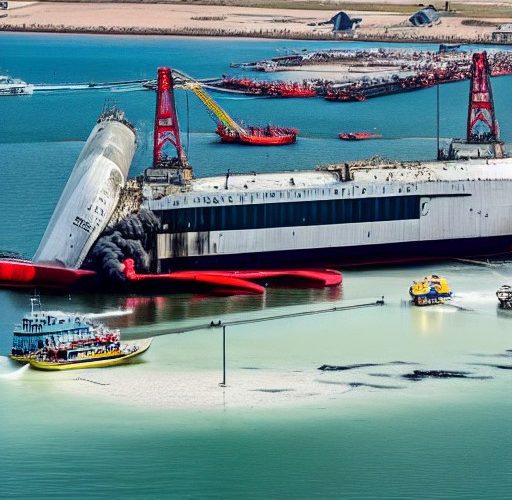The Gulf of Oman is once again making headlines as Iran claims to have seized a US-bound oil tanker. This breaking news has sent shockwaves across the globe, leaving many wondering what implications this could have for the already tense relations between the United States and Iran. In this blog post, we’ll explore the possible responses from both sides, what will happen to the tanker and its crew, and most importantly, what this means for the future of US-Iran relations. So buckle up and get ready for a deep dive into one of today’s hottest topics!
Iran Claims to have Seized US-Bound Oil Tanker
Iran’s Revolutionary Guard has claimed responsibility for seizing a US-bound oil tanker in the Gulf of Oman. According to reports, the vessel was carrying 2 million barrels of crude oil and was intercepted near the Iranian island of Abu Musa.
The move comes amid escalating tensions between Iran and Western powers over its controversial nuclear program. It also follows a series of attacks on shipping vessels in the region, which have been blamed by some on Iran.
While details remain scarce, it is clear that this latest incident will only add fuel to an already volatile situation. The United States has yet to comment officially on the matter, but it is likely that they will respond with force if necessary.
For now, all eyes are on Iran and their next move. Will they release the tanker and crew unharmed? Or will they use them as bargaining chips in their ongoing dispute with the West? Only time will tell.
What are the Implications of Iran’s Actions?
The seizure of a US-bound oil tanker by Iran in the Gulf of Oman has significant implications for the region and beyond. Firstly, it will raise tensions between Washington and Tehran at a time when relations are already strained due to recent events such as the killing of Iranian General Soleimani.
Secondly, this action could lead to increased instability in the Persian Gulf, which is an important global shipping route. This could potentially impact global oil prices if there is disruption to shipments from the region.
Thirdly, it may prompt other countries with interests in the Middle East to take sides or get involved. For instance, China imports large quantities of oil from Iran and may see this latest development as a challenge to its energy security interests.
It raises questions about international law and maritime norms. The tanker was allegedly seized because it violated environmental regulations but some experts argue that this was just a pretext for seizing a valuable asset owned by foreign entities.
These implications suggest that this latest incident will have far-reaching consequences that go beyond just US-Iran relations.
What are the Possible Response from the United States?
The US has condemned Iran’s actions and is likely to respond with force. President Trump, who withdrew from the 2015 nuclear deal with Iran, has already warned that any attack on US interests will be met with “great force.” He also authorized a drone strike that killed top Iranian General Qasem Soleimani in January.
Possible responses could include military action against Iran or its proxies, economic sanctions or diplomatic pressure. The US may also seek international support for its stance against Iran.
However, it remains to be seen how the current administration will approach this latest incident. President-elect Joe Biden has pledged to re-engage with Iran and revive the nuclear agreement if Tehran returns to compliance. But until he takes office in January 2021, it is unclear what steps his administration will take regarding this situation.
The US response will have significant consequences not only for US-Iran relations but also for regional stability and global oil markets. The situation is fluid and rapidly evolving; therefore, we can expect more developments in the coming days and weeks ahead.
What will happen to the Tanker and its Crew?
The US-bound oil tanker that was seized by Iran in the Gulf of Oman has now left its original route and is being redirected to an Iranian port. The tanker’s crew is reportedly safe, but their fate remains uncertain.
The Tanker, called MT Riah had been sailing through the Strait of Hormuz when it was suddenly diverted towards Iranian waters. It was later revealed that the ship had been seized due to suspicions of smuggling fuel.
In such cases, international law requires that Iran provides a fair trial for both the vessel and its crew. However, given Iran’s recent history with these types of situations, there are concerns about how this will be handled.
It’s possible that negotiations could take place between Iran and the United States over the release of both the tanker and its crew. But as tensions continue to rise between these two nations, it remains unclear what actions will be taken next.
Until then, all we can do is hope for a peaceful resolution to this latest development in an already complex situation in one of the world’s most critical waterways.
What is the Future of US-Iran Relations?
It is clear that the seizure of the US-bound oil tanker by Iran has further escalated tensions between the two countries. The incident comes amid a backdrop of increased sanctions and military posturing, and it remains to be seen what steps either side will take next.
The United States has already indicated that it is closely monitoring the situation and will not tolerate any interference with its ships in the region. The Trump administration may opt for a show of force, such as sending more naval vessels to patrol the Gulf of Oman or imposing even tighter economic sanctions on Iran.
Iran, meanwhile, may view this as an opportunity to demonstrate its strength and willingness to challenge American power in the region. It could continue seizing ships or possibly even launch military strikes against US assets.
Ultimately, it seems unlikely that either side will back down without significant concessions from the other. As long as tensions remain high and both sides refuse to compromise, we can expect continued volatility in US-Iran relations.












